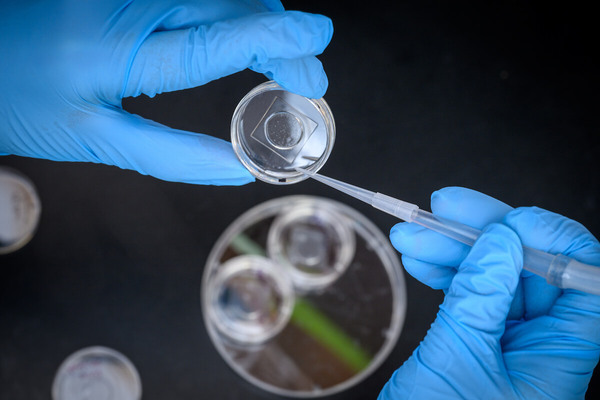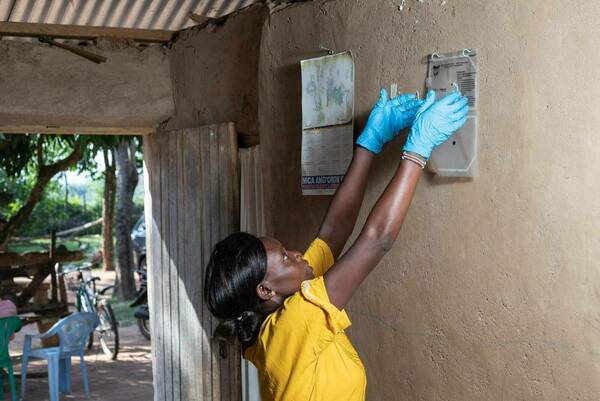Multi-unit research teams receive support for Bioengineering and Life Sciences projects
Three collaborative, multi-unit teams have been awarded funding by the University-wide Bioengineering & Life Sciences Initiative to advance health-related research and education.
To complement the investigator-led awards the initiative made earlier this year, the Bioengineering & Life Sciences Initiative introduced the unit-level matching grant program to incentivize centers, institutes, departments, and similar entities to collaborate on activities related to its research themes of health foundations, health technologies, and health equities.
Of the teams awarded funding, one will focus on addressing the opioid crisis, another aims to monitor and respond quickly to emerging diseases, and a third will involve undergrads in data science to study health technologies and solutions.
“Sometimes academic units can see broader opportunities missed by individual faculty members, and we want to be there to support their emerging efforts. Through these initial awards, we are proud to fund some really exciting and critical activities happening at the intersection of science and engineering,” said Paul Bohn, director of the Bioengineering & Life Sciences Initiative.
Addressing the opioid crisis

Notre Dame Serving Community Analytical Needs (ND-SCAN) will develop sensor technologies that healthcare providers, law enforcement, and harm reduction groups can use in the field to quickly and accurately identify high-potency synthetic opioids, cannabinoids, and other psychoactive substances in complex mixtures. These technologies will give caregivers, emergency responders, and health departments across Indiana and neighboring states critical information they need to address new substances infiltrating local illicit drug supplies.
ND-SCAN will use a new, 1,000-square-foot wet lab in McCourtney Hall as its headquarters to support the development of point-of-care and field technologies to address the opioid crisis and evaluate drug analysis technologies. ND-SCAN is led by Principal Investigator Nosang Myung, director of the ND Sensor Initiative, faculty director of the Analytical Science and Engineering at Notre Dame (ASEND) Core Facility, and the Bernard Keating-Crawford Professor of Engineering, and co-PIs Marya Lieberman, the Nancy Dee Professor of Cancer Research in the Department of Chemistry and Biochemistry, and Matthew Webber, acting director of the Berthiaume Institute for Precision Health and the Keating-Crawford Collegiate Professor in the Department of Chemical and Biomolecular Engineering.
Improving biological threat response

Notre Dame Biothreat Surveillance, Containment & Operational Preparedness Engine (ND-BIOSCOPE) is a partnership of several entities, including the Berthiaume Institute for Precision Health, the ND Sensors Initiative, the Remote Emerging Disease Intelligence Network (REDI-NET), and the Warren Center for Drug Discovery.
ND-BIOSCOPE aims to address challenges to tackling emerging pathogenic threats by closing critical weaknesses in the nation’s defenses, such as slow data sharing, outdated monitoring systems, and limited coordination between agencies. The project will enhance early warning systems and accelerate countermeasures by integrating cutting-edge sensor technologies, real-time genomic sequencing, and machine learning-driven analytics.
A key pillar of ND-BIOSCOPE is building a sustainable pipeline of expertise by equipping researchers, students, and global partners with the skills, tools, and training necessary to combat evolving biological threats.
Another important goal is training the next generation of experts. Through new courses, hands-on lab work, and field training, ND-BIOSCOPE will prepare students, researchers, and global partners to respond to the biological challenges of the future.
ND-BIOSCOPE is led by Principal Investigator Webber and co-PIs Myung, Nichole Achee, a research professor in the Department of Biological Sciences and an associate professor in the Eck Institute for Global Health, and Brian Blagg, director of the Warren Center for Drug Discovery and Development and Charles Huisking Professor of Chemistry and Biochemistry.
Developing data-driven solutions

The Health Data and Analytics Challenge (HDAC) will provide undergraduate students with the opportunity to analyze real-world datasets, detect population health differences, identify gaps in access that may affect health outcomes, and recommend possible interventions to improve health and the quality of services in various communities.
The Health Data and Analytics Challenge builds on the success of the Health Equity Data Science Challenge, which started in 2024. HDAC is expected to become an annual event and will produce data-driven solutions to pressing health issues. HDAC will showcase Notre Dame’s data science student pipeline to a panel of judges from industry, government, and academia. In collaboration with the Lucy Family Institute for Data & Society and the Berthiaume Institute for Precision Health, HDAC will amplify the mission of BELS to develop future generations of leaders who are equipped to advance human health through multidisciplinary teams, tools, and techniques.
HDAC is led by Principal Investigator Katie Liu, assistant director of research programs for the Lucy Family Institute for Data & Society, and Prakash Nallathamby, associate director of research for the Berthiaume Institute for Precision Health and an assistant professor of the practice.
Originally published by at strategicframework.nd.edu on September 05, 2025.
Latest Research
- NSF Cyber SMART’s fall meeting shapes fifth year of project, legacy and future plans, and adds new memberThe U.S. National Science Foundation (NSF) Cyber SMART center gathered for its fall meeting on the University of Notre Dame campus this September. The meeting served as a checkpoint with progress reports and new projects from research leads and students…
- Slavic and Eurasian studies professor wins Humboldt fellowship to research how Russia’s religious past shapes its presentWhen Russia invaded Ukraine on Feb. 24, 2022, Sean Griffin realized his second book needed a new title. Griffin, an associate professor in the University of Notre Dame’s Department of…
- Notre Dame’s R.I.S.E. AI Conference builds interdisciplinary collaboration to inform human-centered artificial intelligenceAs artificial intelligence (AI) transforms nearly every sector of society — from healthcare and education to governance and global development — a critical question emerges: How can we conscientiously design and deploy these powerful technologies to positively impact society? This…
- University of Notre Dame joins the Global Coalition of Ukrainian StudiesThe University of Notre Dame has joined the Global Coalition of Ukrainian Studies after signing a Memorandum of Cooperation (MOC), formalized on September 24, 2025, at the Ukrainian Institute of America in New York City. Notre Dame joined four other American…
- The University of Notre Dame’s Mendoza College of Business and Industry Labs team up to inspire national security manufacturing competitiveness in the regionThe South Bend - Elkhart Region is full of manufacturing companies that are poised to grow, and Executive Master of Business Administration (EMBA) and Master of Business Administration (MBA) students at the University of Notre Dame are finding innovative ways to contribute to that growth. Earlier…
- Notre Dame research informs WHO conditional recommendation for spatial repellents in malaria vector controlThe World Health Organization (WHO) recently announced a “conditional recommendation” for spatial emanators, also known as “spatial repellents,” in the fight against malaria. This key determination was informed by spatial repellent studies that included the Advancing Evidence for the Global Implementation of Spatial Repellents (AEGIS) Project in Kenya, led by the University of Notre Dame and funded by Unitaid. The findings from this particular study were recently published in The Lancet.













